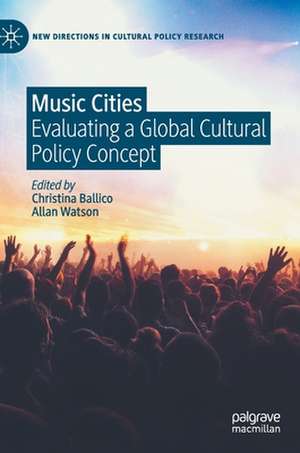Music Cities: Evaluating a Global Cultural Policy Concept: New Directions in Cultural Policy Research
Editat de Christina Ballico, Allan Watsonen Limba Engleză Hardback – 13 iun 2020
| Toate formatele și edițiile | Preț | Express |
|---|---|---|
| Paperback (1) | 775.65 lei 43-57 zile | |
| Springer International Publishing – 13 iun 2021 | 775.65 lei 43-57 zile | |
| Hardback (1) | 780.68 lei 43-57 zile | |
| Springer International Publishing – 13 iun 2020 | 780.68 lei 43-57 zile |
Din seria New Directions in Cultural Policy Research
- 20%
 Preț: 876.51 lei
Preț: 876.51 lei - 11%
 Preț: 508.17 lei
Preț: 508.17 lei - 15%
 Preț: 464.50 lei
Preț: 464.50 lei -
 Preț: 389.70 lei
Preț: 389.70 lei - 18%
 Preț: 725.92 lei
Preț: 725.92 lei -
 Preț: 382.75 lei
Preț: 382.75 lei - 15%
 Preț: 640.06 lei
Preț: 640.06 lei - 15%
 Preț: 640.55 lei
Preț: 640.55 lei - 15%
 Preț: 502.22 lei
Preț: 502.22 lei -
 Preț: 383.33 lei
Preț: 383.33 lei - 15%
 Preț: 527.66 lei
Preț: 527.66 lei - 15%
 Preț: 581.33 lei
Preț: 581.33 lei - 15%
 Preț: 527.97 lei
Preț: 527.97 lei - 18%
 Preț: 775.65 lei
Preț: 775.65 lei -
 Preț: 242.00 lei
Preț: 242.00 lei - 18%
 Preț: 722.43 lei
Preț: 722.43 lei - 18%
 Preț: 892.74 lei
Preț: 892.74 lei - 18%
 Preț: 780.19 lei
Preț: 780.19 lei - 18%
 Preț: 893.71 lei
Preț: 893.71 lei
Preț: 780.68 lei
Preț vechi: 952.05 lei
-18% Nou
Puncte Express: 1171
Preț estimativ în valută:
149.38€ • 156.39$ • 123.60£
149.38€ • 156.39$ • 123.60£
Carte tipărită la comandă
Livrare economică 07-21 aprilie
Preluare comenzi: 021 569.72.76
Specificații
ISBN-13: 9783030358716
ISBN-10: 3030358712
Pagini: 202
Ilustrații: XIII, 194 p. 2 illus.
Dimensiuni: 148 x 210 mm
Greutate: 0.4 kg
Ediția:1st ed. 2020
Editura: Springer International Publishing
Colecția Palgrave Macmillan
Seria New Directions in Cultural Policy Research
Locul publicării:Cham, Switzerland
ISBN-10: 3030358712
Pagini: 202
Ilustrații: XIII, 194 p. 2 illus.
Dimensiuni: 148 x 210 mm
Greutate: 0.4 kg
Ediția:1st ed. 2020
Editura: Springer International Publishing
Colecția Palgrave Macmillan
Seria New Directions in Cultural Policy Research
Locul publicării:Cham, Switzerland
Cuprins
1. Introduction.- 2. Re-Rewind: Heritage, representation and music city aspiration in Southampton.- 3. Community well-being, post-industrial music cities and the turn to popular music heritage.- 4. Beyond nostalgic Havana: Music and identity in the Fábrica de Arte Cubano.- 5. The place of the Beatles within Liverpool as a UNESCO City of Music.- 6. Chennai: Culture at the cusp of change.- 7. A Bottom-up Strategy for Music Cities: The Case of San Juan, Puerto Rico.- 8. Regulating the San Francisco sound: How a music venue crackdown inspired pioneering advancements in entertainment regulation and support.- 9. The UK live music census: making live music count in Glasgow, Newcastle, Oxford, and beyond.
Notă biografică
Christina Ballico is Head of the Masters of Creative Industries at JMC Academy, Brisbane, Australia. Ballico is also an Adjunct Research Fellow at the Queensland Conservatorium Research Centre, Griffith University, Brisbane, Australia. Her research examines music industries and scenes, music cities and cultural policy.
Allan Watson is Senior Lecturer in Human Geography at Loughborough University, UK. Watson has published widely on the geographies of music. He is author of Cultural Production in and Beyond the Recording Studio (2014) and co-editor of Rethinking Creative Cities Policy: Invisible Agents and Hidden Protagonists (2015).
Allan Watson is Senior Lecturer in Human Geography at Loughborough University, UK. Watson has published widely on the geographies of music. He is author of Cultural Production in and Beyond the Recording Studio (2014) and co-editor of Rethinking Creative Cities Policy: Invisible Agents and Hidden Protagonists (2015).
Textul de pe ultima copertă
This book provides a critical academic evaluation of the ‘music city’ as a form of urban cultural policy that has been keenly adopted in policy circles across the globe, but which as yet has only been subject to limited empirical and conceptual interrogation. With a particular focus on heritage, planning, tourism and regulatory measures, this book explores how local geographical, social and economic contexts and particularities shape the nature of music city policies (or lack thereof) in particular cities. The book broadens academic interrogation of music cities to include cities as diverse as San Francisco, Liverpool, Chennai, Havana, San Juan, Birmingham and Southampton. Contributors include both academic and professional practitioners and, consequently, this book represents one of the most diverse attempts yet to critically engage with music cities as a global cultural policy concept.
Caracteristici
Evaluates the globalisation of the ‘music city’ as an urban cultural policy paradigm Examines the advantages and challenges of adopting music city policies in a range of cities in different geographical contexts Argues that local geographical, social and economic contexts and particularities shape the nature of music city policies (or lack thereof) in particular cities
